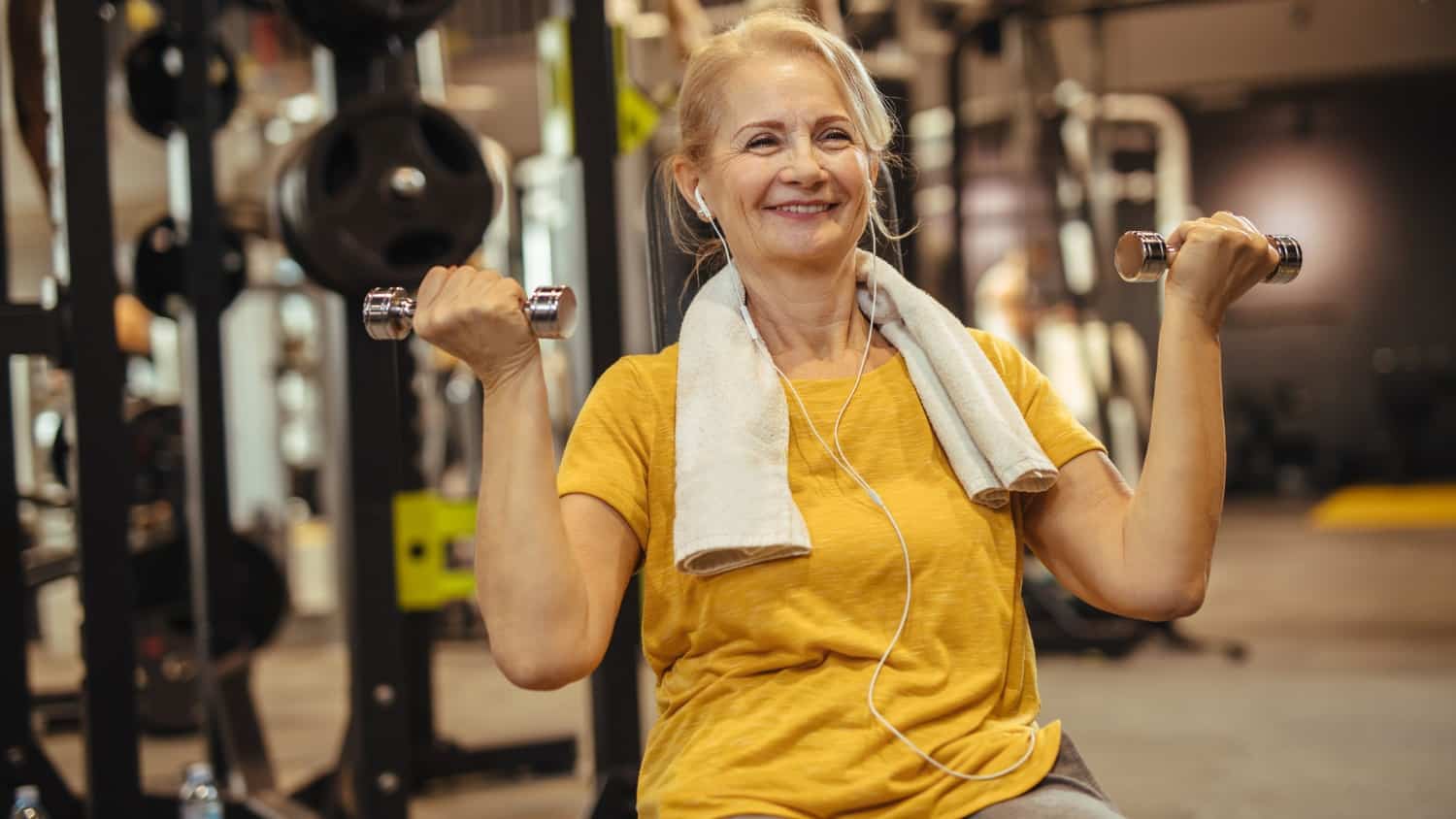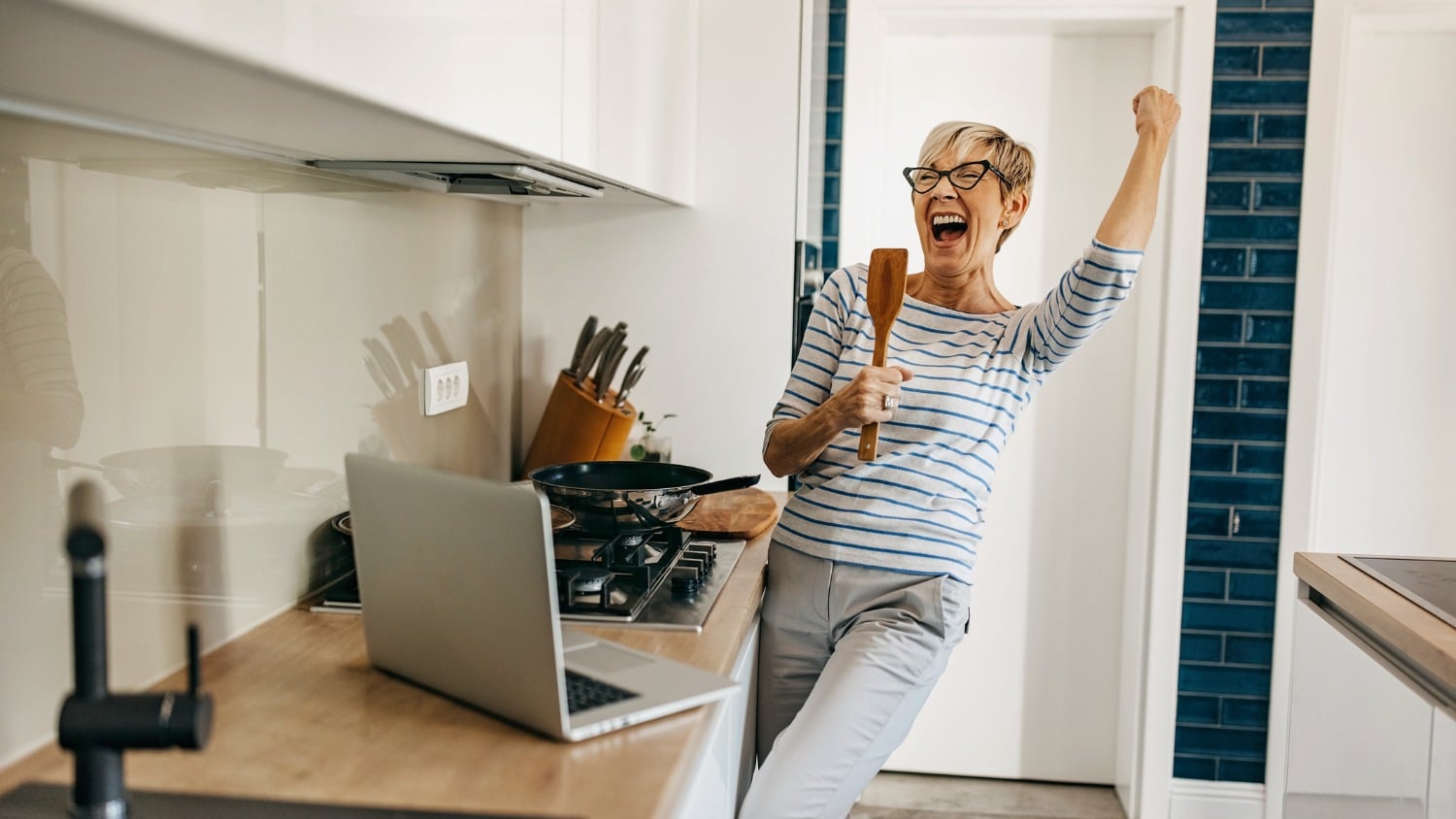How Exercise Can Help Lift Our Mood at Difficult Times
Are you feeling anxious or worried some of the time? Are you struggling with personal challenges or everything that’s going on in the world around us? Are you looking for ways to help cope at this difficult time?
Let me tell you about Sally*. Sally is a member of our online exercise Studio. She’s struggling with family concerns and worrying about world events. Sally hadn’t been in the Studio for a week or so, as she was preoccupied and feeling low.
Then, she popped back in to do a new exercise video (keep scrolling down to do the same video!). She posted in our forum to say how much she enjoyed doing it, how much it helped her to lift her mood and feel better.
Of course, doing a 10-minute exercise video didn’t change the situation, but it did lift her mood and help relieve some of her anxieties.
We all know exercise is good for our physical health. That doesn’t mean we all do it, but we do know it!
But Do You Know How Much Exercise Can Help Your Mental and Emotional Wellbeing?
In this article, I am going to share how exercise can help you to deal with challenging times. Whether it’s a family situation, what’s happening in the world around us, or when we are facing an uncertain future, exercise can help us cope.
When we are worried or anxious about ourselves, our families, or the world around us, it’s easy to let our regular habits slide. Sometimes the situation forces our routines to change and prevents us from doing our usual activities.
Unfortunately, this means we stop doing some of the things that could help us at this difficult time. We get out of the habit of doing regular exercise, going for walks and being generally active. Or we just aren’t able to do these things (for example, if we can’t leave the house to get to our class or gym session).
How Does Exercise Help Us to Cope with These Challenges?
Exercise relieves stress, helps you sleep better, and boosts your overall mood. It can also have a positive impact on depression and anxiety.
Exercise promotes changes in the brain which endorse feelings of wellbeing. It also releases endorphins, powerful feel-good chemicals.
The enhanced circulation from exercise will help to relax tense muscles, relieve headaches, and reduce other symptoms of stress. When your body feels better, your mind will, too.
What’s clear is that exercise can improve our mood in the short term and help promote better mental and emotional wellbeing in the longer term.
What Kind of Exercise Is Going to Help, Though?
Any kind of exercise is better than none. The best type, however, is one you enjoy. The more you enjoy it, the more likely to keep doing it!
It’s also excellent to do something that uses your full attention. Anything that fully absorbs and engages you and takes you away from your concerns is hugely beneficial.
When you focus on your exercises, your brain has a chance to switch off from everything else. Doing an exercise video at home can help with this, as you don’t have to think about what to do; you just watch, listen, and follow along.
There’s a great saying that at difficult times, you should ‘focus on actions, not outcomes’. You don’t know what’s going to happen, and you may not have much control over the outcomes, so focusing on them is only going to be detrimental. However, you can choose your actions – what you do every day and how you spend your time.
When there are so many things outside of our control going on around us, it can feel very unsettling, so we need to double down on the things we can change.
When we exercise (or just move more), we are being proactive and taking action in areas we can control. It gives us a sense of confidence, of feeling in control of our own lives.
When you are taking the time to exercise, it makes you feel better today. It’s also important because you are doing something for your future.
It’s a hopeful activity – you are doing something for the long term. I think that sends an important message to your psyche. That there is hope, it is worth doing things for the future.
For example, the message might be:
- “I’m exercising to stay strong so that I can keep up with my grandchildren.”
- “I’m working to improve my balance so that I can feel strong and steady on my feet (especially when walking on uneven surfaces).”
- “I’m exercising to stay fit so that I can keep looking after my garden.”
Whatever the message is (whatever is important to you), the key is that you are telling yourself that you are working towards the future. I have seen a lot of people talk about how much they benefit from this aspect of staying active.
So, What Can You Do to Cope in Difficult Situations?
Should you start exercising for an hour a day? Take up jogging or learn a challenging new sport?
No! Don’t set unrealistic targets, don’t be too ambitious, and don’t make it too hard for your self. When you are stressed and have a lot going on, you need to make it as easy as possible. Easy isn’t cheating; it’s the key to success.
Three things will help you get started and make it easy:
- Do something you think you will enjoy
- Do something you feel confident doing
- Start small
What Might This Mean for You?
Perhaps you could go for a 10-minute walk every morning? You will get outdoors, get fresh air, and daylight. You may get out in nature, which also has significant mental health benefits.
Maybe don’t even set a limit. Just say, “I’m going to walk to the end of the road and come back.” Chances are you’ll get there and want to walk further if you can! Even if you don’t, you will walk there and back, and you will feel better afterwards.
If you decide to try using online exercise videos, don’t start with a 45-minute video! Choose one that lasts for 5 minutes. Do it, enjoy it, and feel good about what you have done. The easier it is, the more likely to do it again the next day.
Here’s the Wake Up, Warm Up! video from our online exercise Studio that helped Sally to feel better. It’s less than 3 minutes long, so it’s super easy for you to click play and do it with me now.
If you would like to exercise from home, take a look at the Vida Wellness Studio where you can enjoy an extensive Video Library and an informative Knowledge Zone with professional advice from expert instructors.
*Sally was happy for me to write about her story, but I have changed her name to protect her privacy.
How does exercise affect your mood? Have you noticed positive changes in mood after you exercise? Please share with our community!






